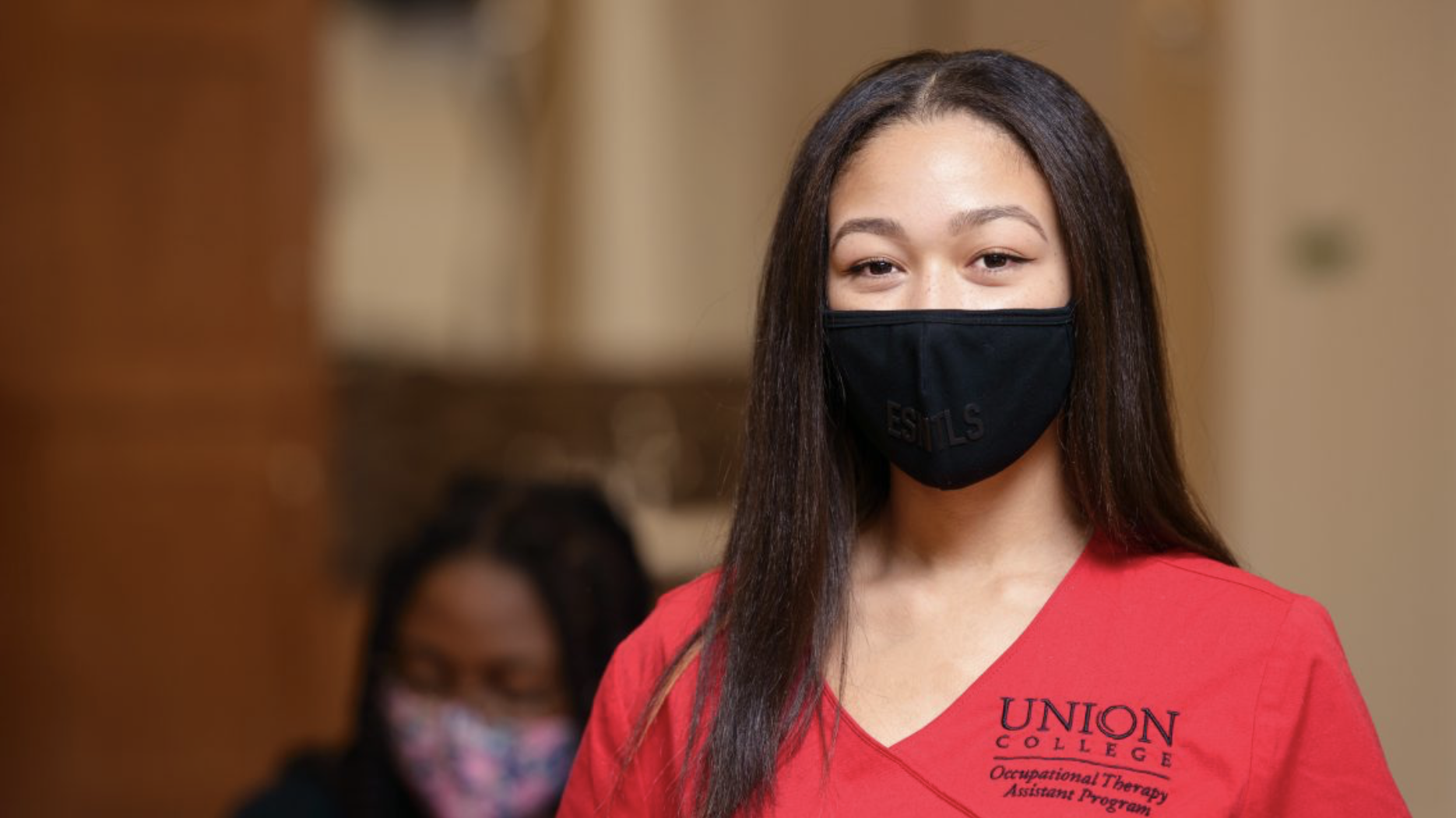
Alex Ulrich is a student in the occupational therapy assistant program at Union College in Lincoln, Nebraska. Photo provided by Mid-America Outlook magazine
Alex Ulrich began college as a kinesiology major. She intended to practice physical therapy with her degree, but when a physical therapist visited her class to help the students understand more about what is involved in the position, Ulrich found herself disappointed.
She asked the physical therapist about how much of his time was spent with the patients and what the day-to-day of the job was like. “He said that most of his time was spent doing paperwork and making sure the equipment was functioning properly,” says Ulrich. “I didn’t like that answer because my whole idea of coming to college was to have that one-on-one time with patients. He explained to me that the assistants were really the ones who spent the most time with patients.” This left Ulrich confused because she didn’t know if she wanted to be an assistant in anything.
Ulrich decided to take some time away from school to reassess her life’s goals. “I went to Italy with Adventist Colleges Abroad, which was one of the best decisions I’ve ever made. I got a lot of time to learn about who I am.” She arrived home with a renewed ability to focus on her interests and assess her career goals, and this newfound focus led Ulrich to Union College.
While doing research on different colleges and their programs, Ulrich came across Union’s Occupational Therapy Assistant program. She thought back to when she’d been told that assistants were the ones who really dealt with clients face-to-face. While looking through other Adventist college programs, she hadn’t found any programs like Union’s. “When I saw that Union had an OTA program, that it was two years, and that I could get my associate’s and start working after I passed my boards, I thought that was really convenient,” she explains.
Mentorship beyond academics
Ulrich was excited about entering Union’s OTA program. What she didn’t realize is that Union’s OTA program is unique in more than just Adventist schools. Union’s OTA program was built and designed around mentorship — engaging learners to develop into “ethical, professional, effective occupational therapy assistants, called by God to service their community, and highly sought-after by employers,” as stated on the Union College website.
Emily Rumery, assistant director of Union College’s Occupational Therapy Assistant program, explains that, “Mentorship is a component that is included directly into our program mission statement, as it is our goal to mentor our students and engage them actively in their own learning process.”
The program’s small class sizes allow students to have direct access to faculty members and have one-on-one attention throughout their courses. Each student is assigned to an academic advisor, who not only helps students with academic questions, but can also be a mentor for helping students achieve their own goals and professional development.
Ulrich experienced this mentorship firsthand. “My advisor has been incredible. In the beginning I was very hesitant, but she has really encouraged me through all these semesters. If I’ve ever had an issue, I’ve felt very comfortable talking to her about it.” She continues, “I was going through a lot this past semester, and there was a day where my teacher Laurel [Radley] could tell I was not having a good day.” Radley sat Ulrich down and asked her what was wrong. “She offered her help where she could. I really appreciated that. If students utilize communication with the professors in the OTA program, they’ll be set.”
Pinpointing Your Purpose
When she first began college, Ulrich’s goal was to help people one-on-one, but she wasn’t sure in what format she would accomplish that.
“I actually want to be a traveling occupational therapist now, which is something I did not know existed before I entered the program,” says Ulrich. While in the program, she learned about the ability to be paid to travel the country and work in different clinics for limited periods of time. “I really like traveling. My whole college career has been one place to another, and I picked up a knack for traveling. I really want to do that with my career.”
Rumery adds that Union places value on community, mentorship, and helping guide students toward their individual goals. “This is directly implemented within the OTA program through our efforts in one-on-one mentorship of our students,” she explains.
In addition, Union offers numerous resources and forms of support for students in the OTA program. Some of these include the Student Success Center, life coaches, counseling, spiritual care and academic accommodations. Faculty are able to assist students by accessing these resources in order to help support a student’s individual goals.
Accepting Help
Ulrich is nearing completion of her OTA degree, and looking back on her path she is able to see the guidance and support she received throughout her time in the program. But she says the most helpful piece of advice she was given while in the program was simply to accept help when it is offered. She concludes, “Laurel Radley once told me, ‘You have a lot on your plate and you’re just pushing through it. But someday you’re going to get burnt out. There are resources so you don’t have to just push through everything. Accept help, because you can’t help others if you’re burnt out.’”
— Ryan Teller is the director of public relations for Union College in Lincoln, Nebraska; This article was originally published on the Mid-America Outlook magazine website.
